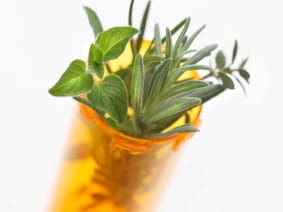Mixing Meds, Herbs and Supplements Interactions between Medicines, Herbs and Dietary Supplements

The Bottom Line
There are nearly 1500 documented interactions between drugs, herbal medicines, and dietary supplements. These interactions can cause a wide variety of harmful effects. Taking an herb or supplement could change the way a prescription medicine works in the body, causing symptoms like an overdose. Or, it might cause the medicine not to work at all.

The Full Story
Do you take medicines? Lots of people do. Do you also take some type of dietary supplement? If so, you have lots of company there, too.
But do you know how and when those medicines, dietary supplements, and herbs interact with each other? There's a little knowledge and a lot of guesswork about this important topic.
Researchers recently examined the available literature to determine what is actually documented about interactions between medicines, herbs, and supplements. They found 1,491 documented types of interactions between medicines and herbal/botanical products, dietary supplements, and other types of supplements. These involved some combination of 509 different medicines and 213 different herbals/botanicals/supplements.
The medicines most often involved were:
- Warfarin, which is used to prevent blood clots. It interacted with more than 100 types of products and supplements.
- Insulin, which is used to treat diabetes.
- Aspirin, used to prevent blood clots.
- Digoxin, used to treat heart failure.
- Ticlopidine, another drug used to prevent blood from clotting.
Of the herbal, botanical, dietary supplement, and vitamin products, these were most often cited as interacting with medicines:
- St. John's wort, a plant-based supplement used to treat mild to moderate depression.
- Magnesium, a mineral found in some antacids and laxatives.
- Calcium, a mineral taken for bone strength.
- Iron, a mineral taken for anemia.
- Ginkgo, a plant-based supplement taken for memory problems with memory and other conditions.
Interactions between medicines and supplements can cause a wide variety of harmful effects. The authors listed many of them. To highlight just one, the serious risk of bleeding, consider these interactions:
- People who take warfarin have an increased risk of bleeding if they also take ginkgo, evening primrose, glucosamine, or licorice.
- The risk of bleeding is increased when people take ginkgo along with aspirin, ibuprofen, ticlopidine, and a number of other drugs.
St. John's wort was associated with a number of drug interactions. For example, St. John's wort decreased the effectiveness of calcium channel blockers (used for high blood pressure), digoxin (used for heart failure), doxorubicin (a chemotherapy drug used to treat some cancers), and some contraceptives.
This study emphasizes the importance of discussing ALL of your drugs – prescription, non-prescription, herbal, and dietary supplements – with ALL of your health care providers and pharmacists. Some interactions aren't as serious as those listed above. Even so, recognizing and avoiding such interactions are an important part of staying well.
Take-Home Messages:
There are nearly 1500 documented interactions between drugs, herbal medicines, and dietary supplements. The most common medicines involved are warfarin, insulin, aspirin, digoxin, and ticlodipine, although there are many others. The most common herbs and supplements involved are St. John's wort, magnesium, calcium, iron, and gingko, though there are many others.
These interactions can cause a wide variety of harmful effects, including bleeding and irregular heart rhythms. Sometimes, taking an herb or supplement changes the way a prescription medicine works in the body. That might cause symptoms like an overdose. Or, it might cause the medicine not to work at all.
Rose Ann Gould Soloway, RN, BSN, MSEd, DABAT emerita
Clinical Toxicologist
Prevention Tips
Discuss ALL of your drugs – prescription, non-prescription, herbal, and dietary supplements – with ALL of your health care providers and pharmacists.
This Really Happened
A 42-year-old woman takes gabapentin, citalopram, and tizanidine for a neurological disorder. She decided to start taking some herbal preparations to help control her symptoms. She researched the products online and then ordered them over the internet.
The herbal medications contained ginseng and blue-green algae. She started taking the herbal preparations daily. After several doses, the patient developed some blurry vision and then fainted at home. When she regained consciousness, she called 911 and was taken to the hospital.
At the hospital, her heart rate was slow and she had constipation. The physician consulted Poison Control. The poison specialist advised that there is a drug interaction between ginseng and both the citalopram and the tizanidine. This leads to an unintentional overdose by increasing the amount of these medications in the bloodstream. This commonly results in a slow heart rate, irregular heart rhythms, fainting, and constipation.
The patient was monitored in the hospital for several hours. Her symptoms resolved as the herbal preparations wore off and she was discharged home. She was advised to discontinue use of the herbal medications.
For More Information
Ginkgo. MedlinePlus, National Institute of Environmental Health Sciences.
St John's wort. National Center for Complementary and Integrative Health.
References
Tsai H-H, Lin H-W, Pickard AS, Tsai H-Y, Mahady GB. Evaluation of documented drug interactions and contraindications associated with herbs and dietary supplements: a systematic literature review. Int J Clin Prac. 2012; 66:1056-1078.Prevention Tips
Discuss ALL of your drugs – prescription, non-prescription, herbal, and dietary supplements – with ALL of your health care providers and pharmacists.
This Really Happened
A 42-year-old woman takes gabapentin, citalopram, and tizanidine for a neurological disorder. She decided to start taking some herbal preparations to help control her symptoms. She researched the products online and then ordered them over the internet.
The herbal medications contained ginseng and blue-green algae. She started taking the herbal preparations daily. After several doses, the patient developed some blurry vision and then fainted at home. When she regained consciousness, she called 911 and was taken to the hospital.
At the hospital, her heart rate was slow and she had constipation. The physician consulted Poison Control. The poison specialist advised that there is a drug interaction between ginseng and both the citalopram and the tizanidine. This leads to an unintentional overdose by increasing the amount of these medications in the bloodstream. This commonly results in a slow heart rate, irregular heart rhythms, fainting, and constipation.
The patient was monitored in the hospital for several hours. Her symptoms resolved as the herbal preparations wore off and she was discharged home. She was advised to discontinue use of the herbal medications.
